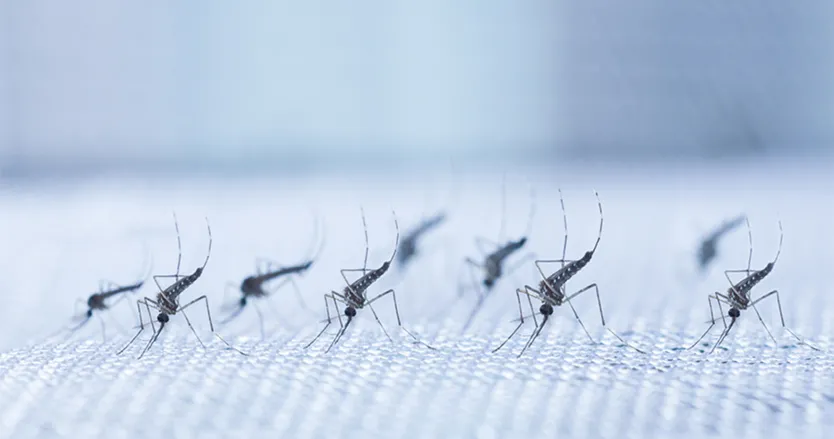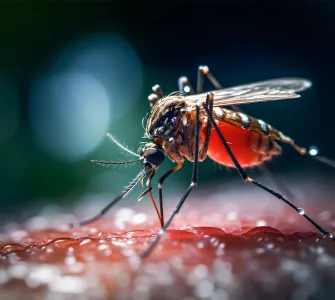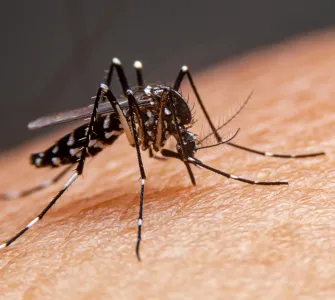Help prevent the spread of dengue through your home and community

No cure exists for dengue, so prevention is key
The threat of dengue is rising fast. Cases have increased 30-50 fold in some areas over a period of just 50 years.1 Based on the current trajectory, one study predicts that over six billion people will be at risk of dengue fever by 2080.2
As there is no cure for dengue, preventing it from happening in the first place (by avoiding mosquito bites) is especially important.3 If you live in a dengue endemic area, there are many things you can do to help prevent the spread of dengue and help keep you and your community safe.4
Help protect your family from dengue: keep the mosquitos out
Dengue is transmitted by the Aedes mosquito species, so controlling mosquito populations is an important way to reduce its impact.3,5,6 Aedes mosquitos prefer to breed in artificial water containers, such as bottles, plant pots, tires, and even fridge trays.7,8 Their eggs can survive for up to one year in dry conditions – only hatching when they come into contact with water.8
“Aedes mosquito lays eggs in stagnant water which can survive up to one year. The eggs can withstand dry conditions and hatch when water is available. Therefore, it is vital to keep neighborhoods clean and free of receptacles that attract the dengue carrying mosquitos.”
– World Health Organization8
Ways to help reduce mosquito populations and prevent dengue in your home
Cover water storage containers, empty and clean them every week3
Empty or remove containers that hold standing water, such as tires, buckets and plant pots3
Put up window and door screens in your home to stop mosquitos from entering your home3,6
Use insect repellents, mosquito coils and vaporizers, and insecticide-treated materials in your home3
If available, use traps for mosquitos, such as ovitraps6
Turn on the air conditioning to keep your home cool6
Coming together as a community to fight dengue
“The World Health Organization (WHO) recognized that dengue control in Sri Lanka could not be achieved by the health sector alone and advocated for community involvement.”
– World Health Organization10
You and your community have a key role in helping to prevent dengue spread – especially when it comes to removing mosquito breeding sites.11 By using multiple mosquito control methods at the same time, people and communities can help stop an outbreak.12 The importance of engaging communities during outbreaks has been seen in Singapore where initiatives to tackle dengue through various control measures including coordinated community engagement campaigns, have been successful.13 Members are encouraged to take personal responsibility for mosquito prevention with actions such as emptying out water vases to prevent mosquito breeding.13 Also, in Mexico, the patio limpio campaign, raises awareness of dengue among the community. The locals also help identify, monitor, and destroy mosquito breeding sites systematically in households.14 For instance, in one Mexican state, households that did not participate in the campaign had well over double the risk of developing dengue than those that did.14
The role of public health organizations and vaccines
Public health organizations can help engage, educate and empower communities such as yours. In Singapore, a government-led traffic light system tells residents about the number of people becoming ill with dengue in their community. It reminds them what to do to help reduce the risk of infection in red or yellow zones and to remain vigilant in green zones.15
In some cases, public health organizations have joined forces to help the community tackle dengue. The WHO and the Ministry of Health launched a campaign in Sri Lanka to educate the community on clearing dengue mosquito breeding sites.10 This initiative halved the number of hospital stays caused by dengue fever and, according to the WHO, may have helped avoid major outbreaks.10
Vaccines are another way to help prevent dengue spreading.16 They may both, help protect the person vaccinated from the complications of dengue and prevent its spread through their community.16,17 In fact, vaccines have recently become available for dengue, and several additional candidates are in development too;3,18,19 the Dengue Vaccine Initiative has been launched to encourage the development and use of vaccines to help prevent dengue cases throughout the world.20
“A vaccine can help prevent dengue, which is caused by four distinct, but closely related dengue viruses, DENV-1, DENV-2, DENV-3, and DENV-4.”
– Centers for Disease Control and Prevention21
Despite these efforts, dengue continues to spread…
Unfortunately, even with global and local efforts, the burden of dengue is ever increasing.3 It is vital that communities and public health organizations continue working together to action integrated approaches for the prevention and control of dengue.
Though often asymptomatic or mild, dengue can quickly become a life-threatening emergency for 1 in 20 people who develop symptoms when they are originally infected.3,22 Speak to your doctor for more information on how to help prevent dengue in your home and community.
References
Mondal N. Lancet. 2023;401(10378):727-728.
Messina JP, et al. Nat Microbiol. 2019;4(9):1508-1515.
WHO. Available at: https://www.who.int/news-room/fact-sheets/detail/dengue-and-severe-dengue. Accessed January 2024.
Centers for Disease Control and Prevention. Available at: https://www.cdc.gov/dengue/prevention/index.html Accessed January 2024.
World Health Organization. Available at: https://www.who.int/activities/engaging-communities-to-sustain-dengue-vector-control Accessed January 2024.
Nature.com. Available at: https://www.nature.com/scitable/topicpage/controlling-dengue-outbreaks-22403714/ Accessed January 2024.
Gubler DJ. et al. Trop Med Health. 2011;39(4 Suppl):3-11.
World Health Organization. Available at: https://www.who.int/srilanka/news/detail/08-07-2019-preventive-action-is-vital-to-curtail-dengue-outbreaks-in-sri-lanka. Accessed January 2024.
Centers for Disease Control and Prevention. Available at: https://www.cdc.gov/dengue/signs-symptoms. Accessed January 2024.
World Health Organization. Available at: https://www.who.int/about/accountability/results/who-results-report-2020-mtr/country-story/2022/community-engagement-for-sustainable-dengue-outbreak-prevention-and-control Accessed January 2024.
Pan American Health Organization. Available at: https://www.paho.org/en/news/3-8-2023-dengue-cases-increase-globally-vector-control-community-engagement-key-prevent-spread# Accessed January 2024.
Centers for Disease Control and Prevention. Available at: https://www.cdc.gov/mosquitoes/during-an-outbreak/index.html. Accessed August 2024.
Sim S, et al. PLoS Negl Trop Dis. 2020;14(8):e0008428.
Tapia-Conyer R, et al. Paediatr Int Child Health. 2012;32 Suppl 1(s1):10-3.
National Environment Agency. Dengue Community Alert System. Available at: https://www.nea.gov.sg/dengue-zika/dengue/dengue-community-alert-system. Accessed January 2024.
Rather IA, et al. Front Cell Infect Microbiol. 2017;7:336.
European Medicines Agency. Available at: https://www.ema.europa.eu/en/news/new-vaccine-protect-people-eu-and-worldwide-against-dengue. Accessed January 2024.
Ooi EE, et al. Sci Transl Med. 2023;15(704):eadh3067.
World Health Organization. Available at: https://www.who.int/news/item/05-10-2023-message-by-the-director-of-the-department-of-immunization--vaccines-and-biologicals-at-who---september-2023 Accessed January 2024.
Pan American Health Organization. Available at: https://www3.paho.org/hq/index.php?option=com_content&view=article&id=5813:2011-regional-meeting-dengue-vaccine-initiative-brazil-analyzed-advances-challenges&Itemid=0&lang=fr#gsc.tab=0 Accessed January 2024.
Centers for Disease Control and Prevention. Available at: https://www.cdc.gov/vaccines/vpd/dengue/index.html. Accessed January 2024.
Centers for Disease Control and Prevention. Available at: https://www.cdc.gov/dengue/healthcare-providers/clinical-presentation.html Accessed January 2024.
Tozan Y, et al. Am J Trop Med Hyg. 2019;100(6):1525-1533.
NHS. Available at: https://www.nhs.uk/conditions/dengue/. Accessed January 2024.
World Health Organization. Available at: https://www.who.int/westernpacific/news/item/11-06-2019-dengue-increase-likely-during-rainy-season-who-warns Accessed February 2024.
Kolimenakis A, et al. PLoS Negl Trop Dis. 2021;15(9):e0009631.
Wongkoon S, et al. Indian J Med Res. 2013;138(3):347-53.
Gov.uk. Available at: https://www.gov.uk/government/publications/mosquito-bite-avoidance-for-travellers/mosquito-bite-avoidance-advice-for-travellers--2. Accessed February 2024.
Centers for Disease Control and Prevention. Available at: https://www.cdc.gov/malaria/resources/repellents.html Accessed February 2024.
UNICEF. Available at: https://www.unicef.org/rosa/stories/dengue-how-keep-children-safe Accessed February 2024.
Centers for Disease Control and Prevention. Available at: https://www.cdc.gov/vector-borne-diseases/prevention/index.html Accessed February 2024.
Help keep yourself safe from dengue when traveling abroad, dengue is a threat in more destinations than before
Dengue is spreading at an alarming rate: before 1970, dengue was only present in a handful of countries but it now exists in over 100 countries worldwide.11 With cases of dengue rising in travelers from regions such as Europe, it is more important than ever to take preventative measures if you are travelling to a dengue endemic area.23
Preventing dengue on your trip
While you can’t completely protect yourself from dengue if you are traveling to an endemic country, there are things you can do to minimize your risk. We look at some tips below.
Research your destination well in advance
Before you travel, check health notices and warnings, as well as country-specific recommendations to find out whether you will be at risk. Bear in mind that, less and less places are now dengue free – some countries previously without dengue have recently reported cases of this disease.
You can check your own government’s travel advice or the websites of the World Health Organization, US Centers for Disease Control and Prevention, or the European Centre for Disease Prevention and Control.
If you are traveling to a dengue-endemic area, prepare against mosquitos before you go
“If you’re in a country where dengue is found, the best way to prevent infection is to avoid being bitten by mosquitos.”
– NHS24
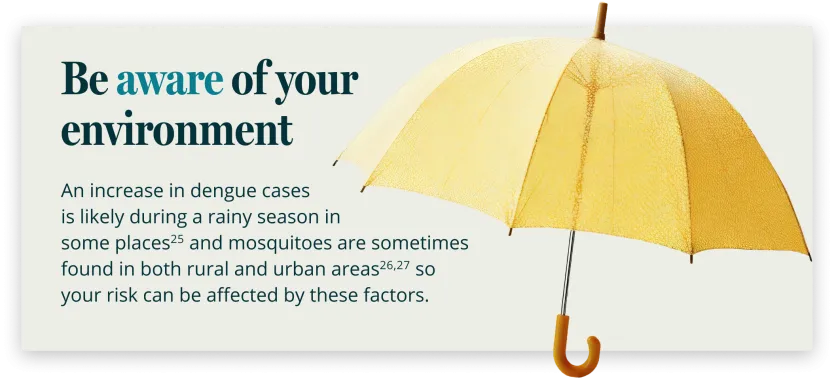
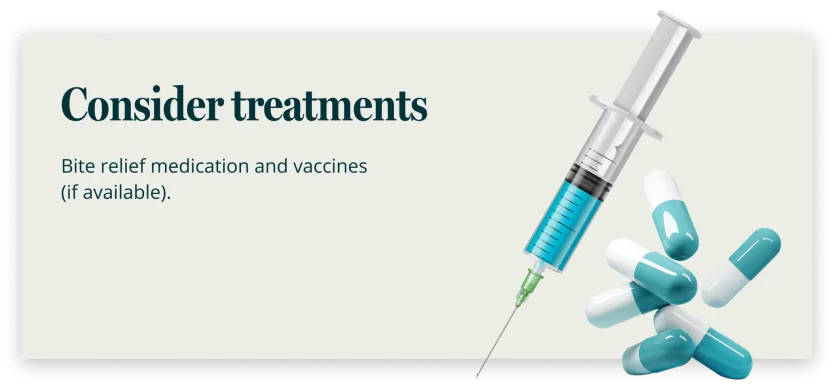
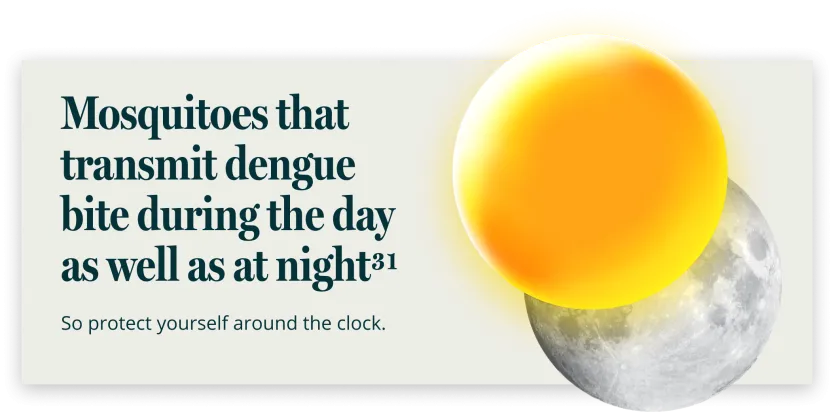
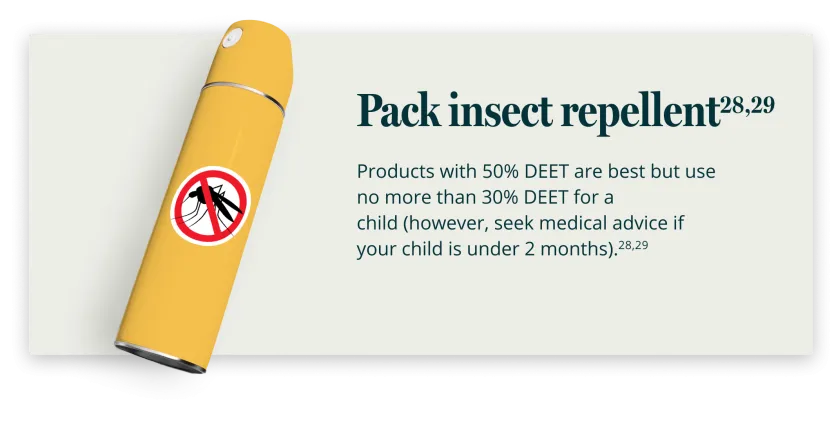
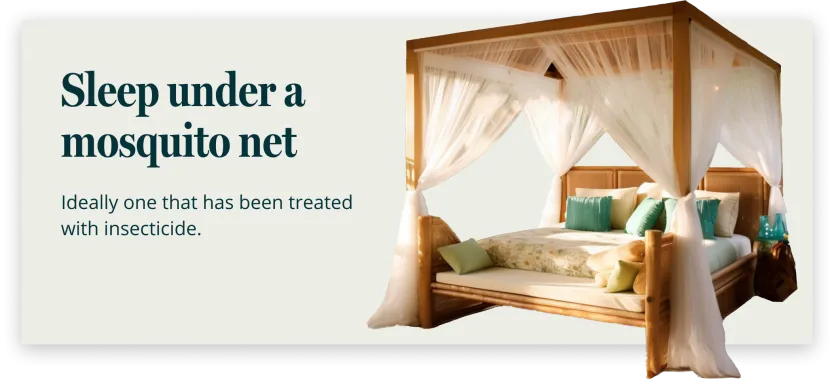
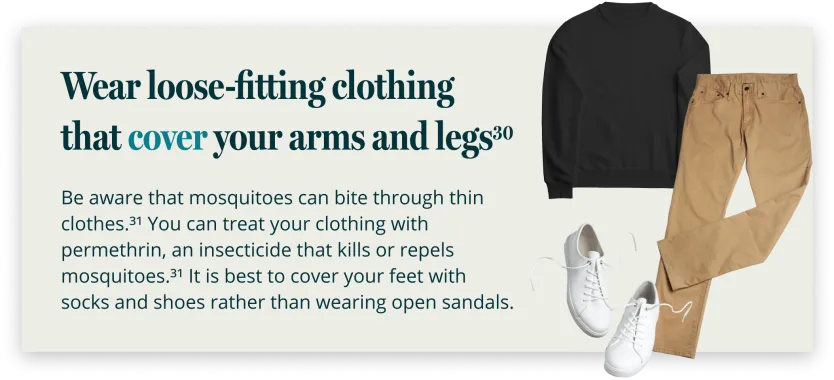
Though often asymptomatic or mild, dengue can quickly become a life-threatening emergency for 1 in 20 people infected.3,22 See your doctor before you travel to a dengue endemic country for advice on how to help prevent this disease when you are abroad.
References
Mondal N. Lancet. 2023;401(10378):727-728.
Messina JP, et al. Nat Microbiol. 2019;4(9):1508-1515.
WHO. Available at: https://www.who.int/news-room/fact-sheets/detail/dengue-and-severe-dengue. Accessed January 2024.
Centers for Disease Control and Prevention. Available at: https://www.cdc.gov/dengue/prevention/index.html Accessed January 2024.
World Health Organization. Available at: https://www.who.int/activities/engaging-communities-to-sustain-dengue-vector-control Accessed January 2024.
Nature.com. Available at: https://www.nature.com/scitable/topicpage/controlling-dengue-outbreaks-22403714/ Accessed January 2024.
Gubler DJ. et al. Trop Med Health. 2011;39(4 Suppl):3-11.
World Health Organization. Available at: https://www.who.int/srilanka/news/detail/08-07-2019-preventive-action-is-vital-to-curtail-dengue-outbreaks-in-sri-lanka. Accessed January 2024.
Centers for Disease Control and Prevention. Available at: https://www.cdc.gov/dengue/signs-symptoms. Accessed January 2024.
World Health Organization. Available at: https://www.who.int/about/accountability/results/who-results-report-2020-mtr/country-story/2022/community-engagement-for-sustainable-dengue-outbreak-prevention-and-control Accessed January 2024.
Pan American Health Organization. Available at: https://www.paho.org/en/news/3-8-2023-dengue-cases-increase-globally-vector-control-community-engagement-key-prevent-spread# Accessed January 2024.
Centers for Disease Control and Prevention. Available at: https://www.cdc.gov/mosquitoes/during-an-outbreak/index.html. Accessed August 2024.
Sim S, et al. PLoS Negl Trop Dis. 2020;14(8):e0008428.
Tapia-Conyer R, et al. Paediatr Int Child Health. 2012;32 Suppl 1(s1):10-3.
National Environment Agency. Dengue Community Alert System. Available at: https://www.nea.gov.sg/dengue-zika/dengue/dengue-community-alert-system. Accessed January 2024.
Rather IA, et al. Front Cell Infect Microbiol. 2017;7:336.
European Medicines Agency. Available at: https://www.ema.europa.eu/en/news/new-vaccine-protect-people-eu-and-worldwide-against-dengue. Accessed January 2024.
Ooi EE, et al. Sci Transl Med. 2023;15(704):eadh3067.
World Health Organization. Available at: https://www.who.int/news/item/05-10-2023-message-by-the-director-of-the-department-of-immunization--vaccines-and-biologicals-at-who---september-2023 Accessed January 2024.
Pan American Health Organization. Available at: https://www3.paho.org/hq/index.php?option=com_content&view=article&id=5813:2011-regional-meeting-dengue-vaccine-initiative-brazil-analyzed-advances-challenges&Itemid=0&lang=fr#gsc.tab=0 Accessed January 2024.
Centers for Disease Control and Prevention. Available at: https://www.cdc.gov/vaccines/vpd/dengue/index.html. Accessed January 2024.
Centers for Disease Control and Prevention. Available at: https://www.cdc.gov/dengue/healthcare-providers/clinical-presentation.html Accessed January 2024.
Tozan Y, et al. Am J Trop Med Hyg. 2019;100(6):1525-1533.
NHS. Available at: https://www.nhs.uk/conditions/dengue/. Accessed January 2024.
World Health Organization. Available at: https://www.who.int/westernpacific/news/item/11-06-2019-dengue-increase-likely-during-rainy-season-who-warns Accessed February 2024.
Kolimenakis A, et al. PLoS Negl Trop Dis. 2021;15(9):e0009631.
Wongkoon S, et al. Indian J Med Res. 2013;138(3):347-53.
Gov.uk. Available at: https://www.gov.uk/government/publications/mosquito-bite-avoidance-for-travellers/mosquito-bite-avoidance-advice-for-travellers--2. Accessed February 2024.
Centers for Disease Control and Prevention. Available at: https://www.cdc.gov/malaria/resources/repellents.html Accessed February 2024.
UNICEF. Available at: https://www.unicef.org/rosa/stories/dengue-how-keep-children-safe Accessed February 2024.
Centers for Disease Control and Prevention. Available at: https://www.cdc.gov/vector-borne-diseases/prevention/index.html Accessed February 2024.





















